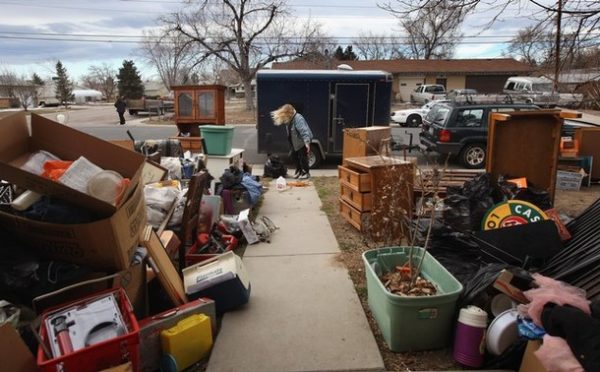Notes
BAG Archive Edition: The Great Unraveling
Archive Note: This post by contributor Robert Hariman appeared on February 5, 2009. Two questions it raises now are: do we look at this photo any differently six months later, and what does it mean to declare the recession “over”? Original post/comment thread here.

by Robert Hariman
Descriptions of the current recession often feature terms of constriction: “cutting back,” “downsizing,” “retrenchment,” “shrinkage.”
Companies are reducing inventories as people are eating in instead of going out, all because bubbles, markets, and sectors have collapsed. With the Dow at a fraction of its former value and the global economy cooling like a dying star, it seems that drawing inward is a universal law of hard times. Until you look at photographs such as this one.
A woman is standing among her possessions after having been evicted from her house. She is seen at the back of the photograph, at the end of the bare concrete sidewalk leading to the street, on the line to the vanishing point. The wind blows her hair across her face, adding insult to injury. She stands as if at a loss. What to do? How can she gather this all up and put it somewhere safe, much less back where it belongs? How can she hold onto anything of value?
The garbage bag in front of her makes the question seem particularly futile: she could put something in it, except that it’s already full and likely to tear anyway when she tries to carry it, if she can carry it far at all. No wonder she looks as if she is having an exasperated conversation with the bag. Who else can she talk to?
The rest of her stuff is strewn along the sidewalk and out into the street. It’s in no order save the haphazard mess made by the eviction team (they have jobs). Drawers are pulled open, a table overturned, the cabinet stands empty and precarious at the curb, boxes are piled helter skelter, a plant dies in the winter air. . . It would look much the same if it had been done by vandals, but then she would know whom to blame. In any case, she isn’t likely to see the people who helped her get into this mess.
This is a scene of personal desolation. It also is a sign of collective danger. The economic implosion does not lead only to the frugality and togetherness celebrated in nostalgic memories of bygone days. Economic disasters also release terrible centrifugal forces: winds of dispersion that tear lives apart and scatter people across places that will never be called home. Paul Krugman put it well when he spoke of The Great Unraveling.
To see what that can mean, you don’t have to look too far.
Cross-posted from No Caption Needed.
(image: John Moore/Getty Images. caption: Mary Ann Smith collects some belongings after an eviction team removed the furniture from her foreclosed house on February 2, 2009 in Adams County, Colorado. Smith said she and her husband had been renting from an owner, who collected the monthly payments but had stopped paying his mortgage. The bank foreclosed on the property and called the Adams County sheriff’s department to supervise the eviction. They managed to borrow enough money to rent another house for themselves and their four children, she said, but not in time to avoid eviction.)


Reactions
Comments Powered by Disqus